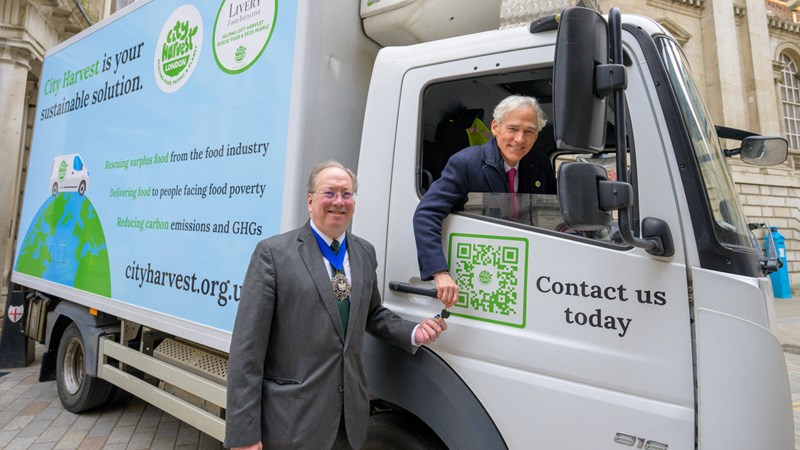Food redistribution charity City Harvest has issued a plea to Liverymen to help identify food distributors, at any stage of the production process (from farm to factory), who have surplus food they would be willing to donate to City Harvest.
This is not a further appeal for money but for help from the whole livery membership and the wider food production community.
Thanks to the generosity of the Livery Charities, the Livery Food Initiative (LFI) has now raised enough money to put two trucks on the road for three years. A newly LFI-liveried lorry was launched on March 5th at Mansion House and, for the second year running, the Lord Mayor kindly agreed to preside over the ceremony and hand over the keys of the truck to Stephen Winningham, Chair of City Harvest, accompanied by several Livery Company representatives and charities.
Raising money for the trucks is one of three crucial asks by City Harvest. The second ask is very simple: City Harvest still needs more food and hopes Livery companies and Liverymen can help.
The general cost of living, inflation, conflict and Brexit all contribute to growing levels of deprivation in Greater London, which continues to have the highest levels of food poverty in the country. Recently released figures from the Food Foundation show a quarter of the London population is living in food poverty. This figure increases significantly in several specific boroughs, particularly in East London (e.g. Newham, where the LFI’s predecessor, the Livery Kitchen Initiative, distributed thousands of ready meals during lockdown in 2020).
Most readers will be familiar with a phrase coined last summer of the ‘holiday hunger’ of children. This has sadly been superseded by the choice for many of heating or eating this winter. The need for surplus food distribution has never been greater and sadly shows no signs of diminishing.
Diminishing sources
Since the end of the pandemic, major food distributors (e.g. Amazon, Ocado) have invested heavily in AI purchasing programmes which have resulted in dramatic drops in available waste from these sources. Whilst this is fantastic management of resources, it has impacted on the City Harvest team’s ability to reduce their waiting list. This coupled with steadily increasing demand means City Harvest is having to go further afield to collect food surplus donations. Thus the need for the new LFI truck.
Through the remarkable tenacity of Food Sourcing Manager Ben Logue, City Harvest will collect any edible produce of pallet size upwards either themselves or through a well-established logistic network throughout the country. There is more information and testimonials on the charity’s website if any Fruiterer would like to introduce new sources of food to City Harvest.
Sarah Calcutt, chair of the Fruiterers Awards Council, is also CEO of City Harvest. She says that in its first eight months, the LFI truck launched last year rescued 138 tonnes of food. That equates to 329,738 meals delivered and 343 tonnes of greenhouse gas emissions prevented.
City Harvest has delivered £240 million of impact at street level in its life. It’s calculated that each meal delivered has an average value of £2, but an £11.70 social return on investment. So much has been achieved – but there is so much more to do and the Livery Food Initiative and the 37 Livery companies that contribute to City Harvest are crucial.
Sarah says: “Stage II was to buy a 7.5t Mercedes small truck (for anyone who’s not au fait with truck sizes, this is similar to one of the larger Ocado van types – other delivery services are available!).
“So, now City Harvest can move larger volumes of food around. We will end up with one truck based at New Spitalfields, another one at New Covent Garden, where we opened a unit in January, as well as a third that will do a circuit of Kent, Wisbech and the West Midlands, collecting from growers, packers and distributors.
“As everyone invests in AI, less and less finished product is available for redistribution and therefore City Harvest is having to push out further down the supply chain,” Sarah adds. “This is a tough ask, but it will bring great benefits – we already feed 82,000 people a week, but as we have a waiting list of more than 80,000, there is still a desperate need to double food volumes – ideally overnight.
“The work we do doesn’t only benefit vulnerable people in need – it really benefits business. There is always a cost associated with disposing of the food you can’t use and City Harvest collects for free and distributes that food for free.”
Specific contribution
“The Worshipful Company of Fruiterers has made an amazing contribution,” says Sarah. “Not least in getting on bikes and cycling around the Isle of Wight last year. That alone funded a new tray washer. We have 3,000 trays passing through our warehouse every day and cleanliness and hygiene is absolutely essential as we’re dealing with vulnerable communities.
“There are also lots of amazing synergies. Several liveryman run or work for businesses that work with us and Charlie Hodges, one of the cyclists who went around the Isle of Wight for us, was also one of our very first donors of food when he was at Belazu. Charlie has sold that business now, but the legacy of his initial commitment is there as the Belazu team was in volunteering recently.”

